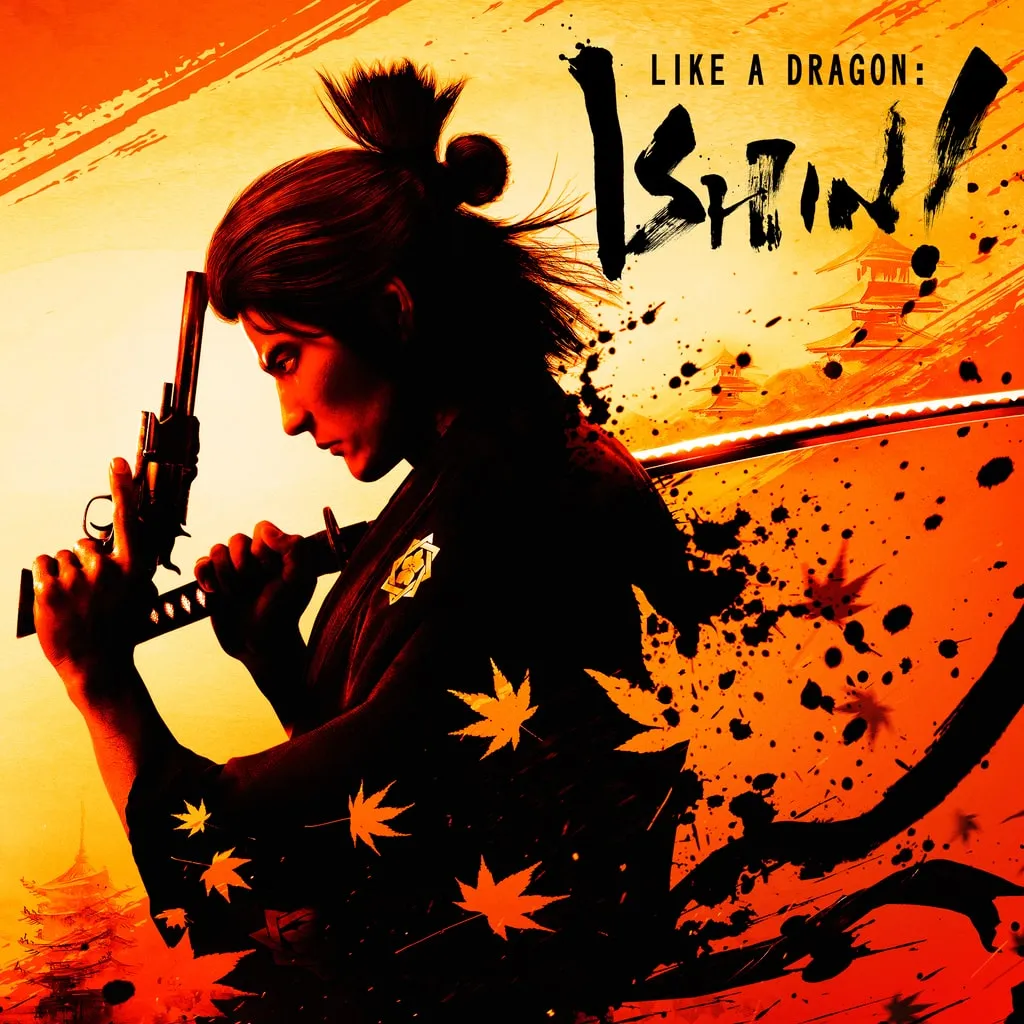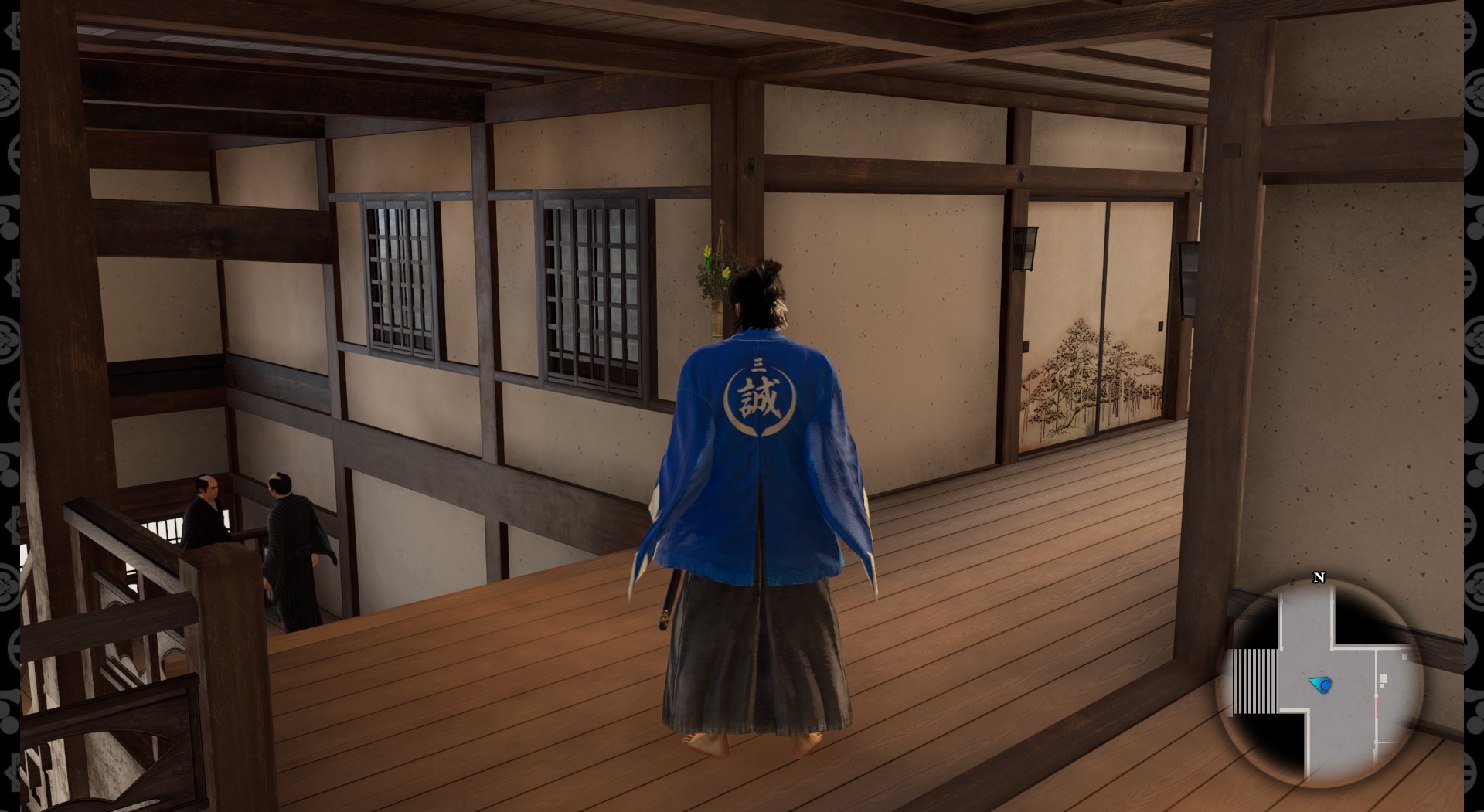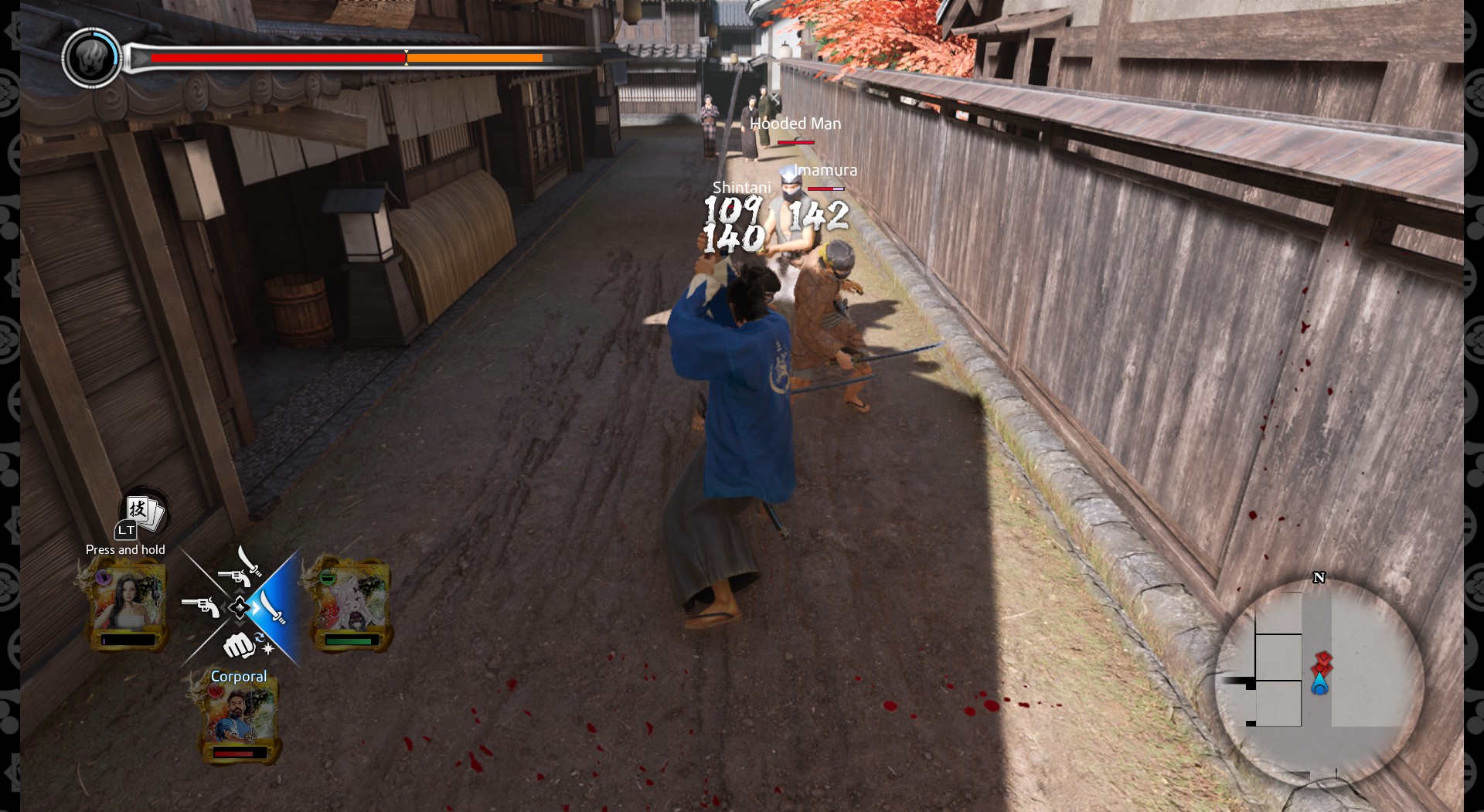Search
[{{{type}}}] {{{reason}}}
{{/data.error.root_cause}}{{{_source.title}}} {{#_source.showPrice}} {{{_source.displayPrice}}} {{/_source.showPrice}}
{{#_source.showLink}} {{/_source.showLink}} {{#_source.showDate}}{{{_source.displayDate}}}
{{/_source.showDate}}{{{_source.description}}}
{{#_source.additionalInfo}}{{#_source.additionalFields}} {{#title}} {{{label}}}: {{{title}}} {{/title}} {{/_source.additionalFields}}
{{/_source.additionalInfo}}- Details
- Category: Computer
- By Daniel Cullen
- Hits: 2563
Like a Dragon: Ishin! (PC)

Like a Dragon: Ishin!
Developed By: Ryu Ga Gotoku Studio
Published By: SEGA
Released: February 21, 2023
Available On: PlayStation 4, PlayStation 5, Microsoft Windows, Xbox One, Xbox Series X/S.
Genre: Action
ESRB Rating: Mature (Violence, Blood, Suggestive Themes, Strong Language, Use of Alcohol)
Number of Players: Singleplayer
Price: $59.99
(Humble Store Link)
One of my first loves is history. Another is video games. So a game set in a historical time period is a wonderful combination of two things I like. Add the Like A Dragon (formerly Yakuza) series to the mix, and Like A Dragon: Ishin! becomes a perfect trifecta of awesome.
First, some background. Like A Dragon: Ishin is a remake of the PS3 version that was Japanese only. The remake not only updates the visuals and replaces many characters with reimagined takes based on later characters in the franchise, but it also adds new content and localizes the script of the original. Like the original game, it's set in a historical era, the late Bakumatsu period of Japan (1853-1867), and covers the life of Sakamoto Ryouma and many other historical figures from that era. The only difference is, the characters are being played by Like A Dragon series characters and their voice actors in a dramatized retelling of real history embellished with some added twists and original story.
The story remains the same. You play from the perspective of Sakamoto Ryouma, a famed samurai, statesman, and leading figure in what became the Meiji Restoration, the restoration of direct imperial rule and the fall of the feudal Tokugawa Bakufu (called the Shogunate in the West) for what became the modern phase of Japanese history. Ishin covers a highly dramatized mix of real-world history and some original inventions to explore the life and times of the era Ryouma lived in. The main conflict is that Ryouma seeks to bring about the end of the Tokugawa government. It is riddled with inefficiency, a rigid and highly unequal class structure, a lack of social mobility for those without proper connections, and is militarily and culturally behind the rest of the world to a worrying degree. Ryouma initially cooperates with a nascent movement in the Tosa Province to restore imperial rule, but after falsely being framed for a murder, is forced to flee. A year later, he is found in Kyo (ie. - modern-day Kyoto), trying to hunt down the real killer while also trying to save Japan before she is destroyed by forces both without and especially from within.
The meat and potatoes of the gameplay are that of an action RPG, much like the modern Like a Dragon titles before the seventh game. You must engage in street combat with various enemies, buy equipment and do sidequests in an open-world city, and complete various story-related missions as part of the plot. There is also a subsystem of ways to power up equipment and skills and maximize their usefulness that is easy to learn and difficult to master as well.

Strong Points: Great remake of the original; lots of added content
Weak Points: Some framerate issues on certain setups; rather high encounter rate
Moral Warnings: Intense violence with profound blood and gore; lots of depictions of cold-blooded murder; intense language using every profanity available throughout the game; partial nudity; visitable brothels (though minus most explicit details); at least one prominent character all but stated to be gay (though portrayed quite negatively); displays of Shinto and Buddhist religious practices; one Japanese diety shown to be real; some questionable ethics by the player are story mandated (using an alias and going undercover); lots of displays of smoking and drinking
The main combat largely revolves around swords and guns, with bare-handed brawling as an alternative. The Brawler style is the weakest but allows many options not available in the other styles. The Swordsman style is strongest generally but has limited viability at range and worst recovery times. Gunman is ideal for ranged combat but weak otherwise. Wild Dancer is a mix of sword and gun attacks that is difficult to learn but quite deadly as you master it.
As Like A Dragon fans would expect, there are a TON of things to do besides the main story. Lots of various casino games, fishing, you can work at an udon (noodle) shop, having your own home with farming and cooking minigames, singing (feudal era karaoke) and dancing, and lots of weird and wacky side-stories when you need a break from the dead serious story.
My only complaints with the gameplay are a rather high encounter rate, even by Like A Dragon standards, but given the frequent need to level up to keep up with the story, this is mostly forgivable. As of the time of this writing, some notable bugs were patched with some of the harder minigames, and more patches are promised to further smooth out the game design progression.
Graphically, it's on par with most contemporary LaD titles, such as Yakuza: Like A Dragon. However, following its time period, it has a grittier, more rustic look for its late feudal setting. There is even a toggle for a black and white like filter for the classic early Japanese samurai movie-like feel. Aside from some very minor errors like some mild clipping through some objects, the animation and graphics are otherwise stunning and detailed.
Music and sounds are a gigantic highlight for this title. On top of retaining many of the songs from the original PS3 Ishin, this remake also has remixes of music for later game characters that were backported to the remake. Due to its theme of late Bakumatsu era Japan, many modern instruments used in contemporary games are switched out for more traditional instruments from the period, like shamisens, flutes, and other less modern implements. Both give the game a very historical feel and make for some very interesting "neo-retro" remixes of the usual rock, electric guitar, and synth music from the more modern games.
Like most Like A Dragon games, it recommends a controller for optimal play; any Steam-compatible controller is acceptable. It is playable with the keyboard, but it's far from ideal. There is support for key remapping, but I found the default keys to be quite accessible.

Higher is better
(10/10 is perfect)
Game Score - 94%
Gameplay - 18/20
Graphics - 9/10
Sound - 10/10
Stability - 5/5
Controls - 5/5
Morality Score - 24%
Violence - 0/10
Language - 3/10
Sexual Content - 3/10
Occult/Supernatural - 0/10
Cultural/Moral/Ethical - 6/10 (+3 for promoting the importance of love for one's fellow man)
Like A Dragon: Ishin is a fundamentally stable game running on Unreal Engine 4.27. It had some problems with framerate stutter initially, patched at the time of this writing., For those who can use AMD FSR, combining that with lowering the rendering resolution can further smooth performance. This is also ideal for Steam Deck users to retain high quality and high frame performance. While the requirements state this game requires DirectX 12, there is a DX 11 mode selectable by tweaking the Steam beta settings for those who have issues with rendering DX 12.
Morally, Ishin has a lot of subject matter not fit for anyone who is not a mature adult. It is based on a real-world history full of treachery, murder, vice, and corruption and reflects this pretty accurately.
Violence is intense and bloody. While blood CAN be disabled in combat, the cutscenes are still going to be gory, and you can't go a chapter without seeing some sort of bloodshed. Violence by blades and guns is on full display. In both cases, very grisly wounds will be shown. As a protagonist, Ryouma nigh always is put in a position of self-defense, though many others can and do kill in cold blood on multiple occasions.
Language is also earthy. The English subtitles translate the Japanese epithets into modern-day profanity, and every word up to and including the F-bomb is dropped in profusion. God's name is not taken in vain; thankfully, the setting is one where Christianity does not play a role for story reasons. There are a few instances where sexual innuendo is dropped, but thankfully this tends to be rare, mostly confined to double entendre and an instance or two of miming generic sexual acts.
As for nudity, there is a lot of partial nudity, including one scene where you will see a few guys naked from behind in a bathhouse. Full frontal nudity is avoided, despite fighting completely naked in a bathhouse at one point (thanks to liberal censor steam). There are brothels one can patronize and will be visited in certain parts of the story. Thankfully, they keep sexual details here generally absent and implied.
Homosexuality is only mentioned twice. One character is based on someone who was historically gay, but despite all the veiled implications of their proclivities, they are regarded by other characters and the story with contempt as degenerate. The other instance is a one-off "love potion gone wrong" cartoony gag that no one involved is thrilled about afterward.
While this story generally remains very well grounded in real history, it does have open displays of both Shinto and Buddhist religious practices. This is historically accurate to the period. Christianity is mentioned in a historical record, but in a neutral sense, merely explaining why it was banned during the Tokugawa Bakufu administration. There is at least one depiction of a Japanese-specific deity all but stated to be real, and indirectly you do make them look good by your actions.
Morally speaking, given this is a highly dramatized and embellished version of Sakamoto's Ryouma's life, it paints a fairly idealistic portrait of the man. While he and many other characters are forced to do questionable activities in the name of survival, including using aliases and going undercover, all the actions you are allowed to take are as lawful as the circumstances make possible, with most story actions involving the changeover of government sought by Ryouma ultimately being done by law with proper authority. Ryouma does at one point join a government-sanctioned paramilitary organization, but even though this provides him liberal license to do as he pleases, the story refuses to let him abuse this authority, though not all his colleagues are so enlightened. There are a few smokers of pipes in-game, and LOTS of alcohol consumption, including by the player character.
One prominent redeeming moral the game espouses is love, specifically love for one's fellow man. Lots of people believe they can control others and decide what is best for them under the iron heel of an oppressive boot, and while it may buy order, it never secures happiness and a better future for everyone. Selfless love, in the sense one chooses to act selflessly to uplift others, is shown to be what resolves the true conflicts of the story.
On technical grounds, some minor issues aside, this is an amazing remake of a great game, though I definitely recommend playing on something more than minimum settings. Morally, it has a huge amount of mature subjects mature I only recommend to mature adults at the very least. As both a Like a Dragon game and one that is based on a very interesting historical era, I definitely recommend this title to all interested in both.






